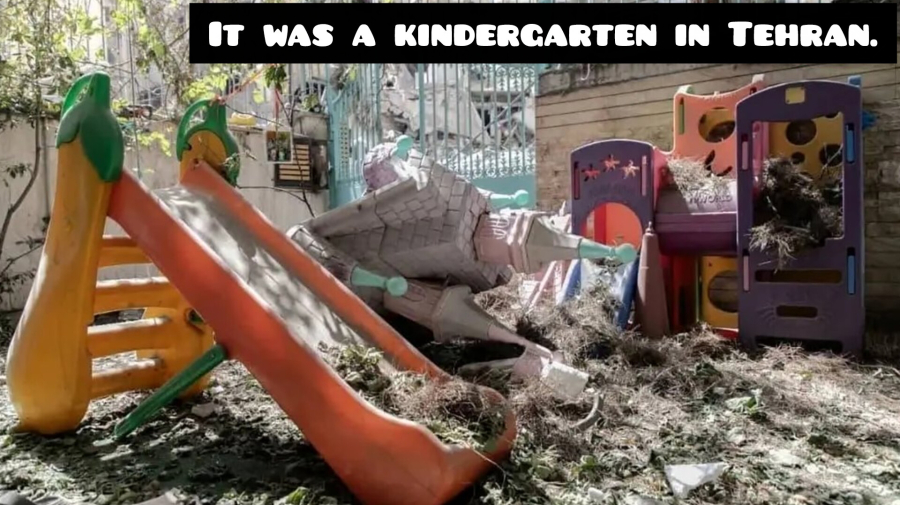By Humaira Ahad
In Tehran’s District 7, on the otherwise quiet Saboonchi Street, the laughter of children once echoed between painted walls and playground swings.
These joyful shrieks were silenced on June 25, 2025, when an Israeli airstrike turned Ranginkaman Kindergarten into rubble.
Adorned with cheerful murals and vibrant classrooms, the kindergarten now stands as stark evidence of a deliberate act of aggression by the child-murdering regime, an unmistakable and blatant violation of international humanitarian law.
The attack, carried out during the unprovoked and unlawful 12-day Israeli war on Iran, levelled the Ranginkaman Kindergarten along with nearby residential homes. The location was entirely civilian, serving solely as a place where toddlers gathered to learn and play.
The kindergarten that almost became a mass grave
Ranginkaman, meaning “rainbow” in Persian, had only been operating for a year.
The play school was known for its cheerful atmosphere, colorful furniture, and dedicated staff. The kindergarten had served as a modest refuge for working-class families in Tehran, a place where they entrusted their children each day while they went to work.
Inside its modest building, walls were decorated with children’s art, and the yard held a swing set in the corner; everything was designed to bring joy and comfort to the young kids.
The sense of joy vanished in an instant when an Israeli terrorist strike struck the kindergarten, shattering the calm and leaving behind a scene of chaos, smoke, and blood.
Just before the attack, there were 20 children inside the kindergarten. Mehri Vatankhah, the director of Ranginkaman, had been increasingly concerned about the rising intensity of air defence activity over the skies of Tehran.
In an interview, she recalled the chilling minutes leading up to the decision to evacuate.
“That day we tried to sing more songs and poems with the children, hoping their voices would drown out the sound of the air defence systems,” she said. “But after lunch, the noise was too loud. I knew I had to call the parents and get the kids out.”
According to Vatankhah, she and her staff contacted the families and began sending the children home early that day. The final child was picked up at approximately 3:20 p.m.
Ten minutes later, the building was destroyed in an Israeli missile strike.
“Had the evacuation been delayed even slightly, the attack would have resulted in one of the deadliest mass killings of children in Iranian history,” a parent, still recuperating from the shock, stated.
A house of joy turned into rubble
The scenes left behind are etched in the minds of those who visited the kindergarten following the brutal Israeli strike. Shattered glass covers the pavement. Children's animated books, half-burned, lie beneath collapsed walls.
What was once a colourful, vibrant learning space is now blackened rubble.
“It had been about a year since this kindergarten was established on Saboonchi Street. From the very first day Ranginkaman opened its doors, few could have imagined that the image of collapsed walls, charred photographs of children, and shattered glass would be the final memory left of this place,” said a parent whose 3-year-old child went to the play school.
Another parent spoke of the terrifying thought of what could have unfolded if the children had remained at the kindergarten.
“Seeing the photos, just imagining that even a tiny scar from broken glass could’ve marked my child’s face still makes me sick,” she said.
The attack, as a deliberate act of terror, was a part of a 12-day war of aggression by Israel to destabilise the Iranian society by targeting civilian infrastructure.
According to official figures, Israel's attacks on Iran have claimed the lives of 1,062 people, including around 140 women and children. Approximately 5,800 others have been injured.
The aggression was launched in the early hours of June 13 and resulted in the martyrdom of many high-ranking military officials, scientists and ordinary citizens in the initial wave.
A broader pattern: children as victims of Israeli aggression
The attack on Ranginkaman is not an anomaly when placed in the broader context of Israeli assaults. It echoes a pattern that has been unfolding for decades, particularly in Gaza.
According to the United Nations Relief and Works Agency for Palestine Refugees (UNRWA), since the beginning of Israel’s genocidal war on Gaza on October 7, 2023, Israel has been killing the equivalent of an entire school class of children every single day, with class sizes averaging 35-45 students.
“Every day since the beginning of the war in Gaza, an average of an entire school class of children has been killed,” Sam Rose, UNRWA’s Director of Operations in Gaza, said on Wednesday.
Medical sources in Gaza report that over 18,000 Palestinian children have been killed since the beginning of Israel’s genocidal war on the besieged territory. Another 16,854 have been hospitalised.
The ongoing war has left over 197,000 dead or wounded, and the majority of them are women and children. More than 11,000 people are still missing, many likely buried under the rubble. Famine conditions have taken the lives of dozens more, including infants.
The deliberate bombing of homes, schools, hospitals, and bakeries has long marked Israel’s genocide in Gaza. Now, with the strike on Ranginkaman Kindergarten in Tehran and attacks on hospitals, residential houses, and ambulances across Iran, this systematic assault on civilian infrastructure exposes a ruthless strategy aimed at destroying the very foundations of civilian life.
Press TV’s website


















